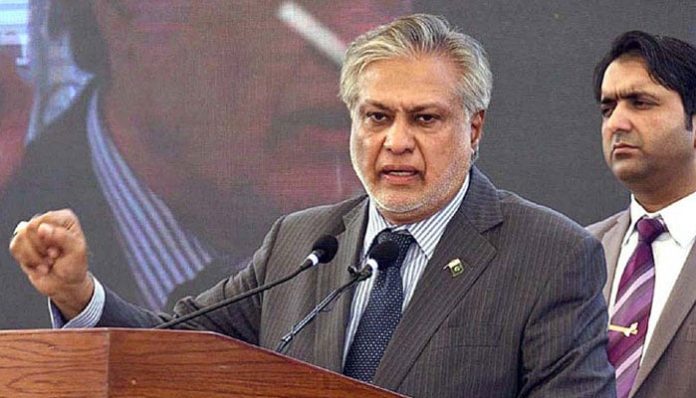ISLAMABAD: Deputy Prime Minister Ishaq Dar has said that United States President Donald Trump’s proposed Gaza peace plan is not the one that contains all of Pakistan’s suggestions.
Dar explained that Islamabad held detailed discussions with Trump’s team, asking them what Washington had in mind.
However, Dar stressed that the draft subsequently prepared by Washington did not include all of Pakistan’s proposed changes. “This draft does not incorporate all our amendments,” he reiterated.
He noted that Pakistan, along with several partner countries, issued a joint statement appreciating Trump’s efforts. At the same time, they repeated their own agenda, with Dar underlining that Islamabad would continue to pursue this agenda alongside Trump and his team.
Dar added that Saudi Arabia, Qatar, Jordan, Egypt, Pakistan, Turkey and Indonesia, along with another country, decided to quietly make serious efforts regarding Gaza. Leaders and foreign ministers of these eight nations scheduled a meeting with Trump and his team.
Before this meeting, the eight countries’ foreign ministers devised a joint strategy. According to Dar, Trump told them that within 48 hours his team and representatives of the eight nations should sit together to prepare a workable plan.
Dar’s statement came a day after Trump — standing alongside Israeli Prime Minister Benjamin Netanyahu — asserted that Prime Minister Shehbaz Sharif and Chief of Army Staff (COAS), Field Marshal Asim Munir, have fully backed his Gaza peace plan.
Just hours before the US president’s announcement, PM Shehbaz had welcomed Trump’s plan, saying a durable peace between the Palestinian people and Israel is essential for regional stability and economic growth.
White House released Trump’s 20-point plan that calls for a ceasefire, a swap of hostages held by Hamas for Palestinian prisoners held by Israel, a staged Israeli withdrawal from the Palestinian enclave, Hamas disarmament, and a transitional government led by an international body.
Troops on ground
In his press conference in Islamabad earlier in the day, Dar, who also holds the foreign minister portfolio, said Pakistan’s leadership will decide on the possible deployment of personnel to a proposed peace force for Palestine, reaffirming that the country’s policy on the issue remains clear with no change in its stance.
The foreign minister defended the country’s decision to back the Gaza peace plan, saying that ground operations in Palestine would primarily be handled by local law enforcement agencies.
“Indonesia has offered 20,000 personnel for the peace force,” he said, adding that Pakistani leadership would also take a decision in this regard.
“I’m sure Pakistan will also decide — the leadership will make the decision — and we have told them that whatever arrangement is made should be documented at the United Nations. There is also the UN peacekeeping force, but this was about a special force only for Gaza,” he added.
Hamas to accept?
Dar pointed out that five countries believe Hamas will accept the plan, and “we should trust their assurances.” The DPM added that the idea also includes establishing an independent technocrat government in Palestine, overseen by a supervisory body largely made up of Palestinians.
Dar clarified that Pakistan had not struck any deal directly with Israel. “If we had to deal with Israel, we would have done it directly. We dealt with the United States, and the United States dealt with Israel,” he asserted.
The deputy PM further confirmed that in his meeting with President Trump, Pakistan, along with seven other nations, agreed to the Gaza agenda. “We raised the matter of ceasefire and aid, and a secret understanding was reached for foreign ministers of the eight countries to hold further consultations with Trump’s team,” he disclosed.
He reiterated that Pakistan, alongside seven other nations, stands firmly united on the Palestinian policy. “Pakistan’s policy is absolutely clear, and there has been no change in it,” Dar underlined.
Engagements at UNGA
Highlighting Pakistan’s diplomatic role at the United Nations General Assembly (UNGA) session, Dar said Prime Minister Shehbaz Sharif led the delegation and held meetings with International Monetary (IMF) officials, the Chief Adviser of Bangladesh, the President of Sri Lanka, as well as leaders from Arab states.
The premier also met with the IMF Managing Director and participated in sessions on sustainable development goals and climate challenges, he added.
Dar said the prime minister vigorously raised the issue of Palestine at the global forum and also highlighted India’s violations of the Indus Waters Treaty. He added that several countries, including Palestine and Turkiye, thanked Pakistan for amplifying the Palestinian cause.
As foreign minister, Dar said he attended nine high-level meetings and over 20 bilateral engagements. These included participation in the OIC’s six-member committee meeting on Palestine, talks with the heads of state of Turkiye and Syria, as well as meetings with the foreign ministers of Canada and Hungary.
He also noted that Arab and Islamic leaders collectively met President Trump, with the leadership focused on stopping the bloodshed of innocent civilians.
Dar said eight countries, including Pakistan, Saudi Arabia, the UAE, and Turkiye, issued a joint statement reaffirming their commitment to resolving the Palestine issue under pre-1967 borders, with Al-Quds Sharif as the capital of an independent Palestinian state. Palestinian authorities, he added, welcomed the joint efforts.
He stressed that the agenda on Palestine was a major one, covering issues such as an immediate ceasefire in Gaza, humanitarian aid, resettlement of displaced Palestinians, stopping Israel’s attempts to annex the West Bank, and ensuring Israel’s complete withdrawal from Palestinian territories. He said the Saudi foreign minister remained in constant contact regarding the peace agreement. –Agencies



